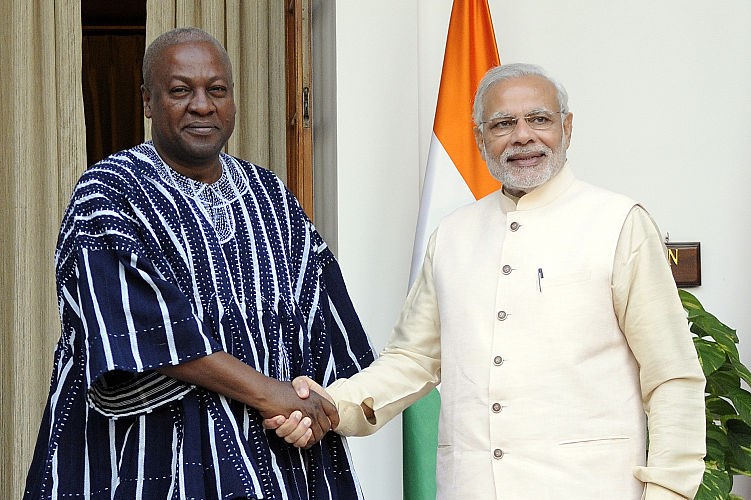Prime Minister Narendra Modi’s two-day visit to Ghana from July 2, marks a landmark moment in India–Ghana relations. This will be the first visit by an Indian Prime Minister to Ghana in more than three decades and PM Modi’s first bilateral engagement with the West African nation. The visit is expected to deepen cooperation in trade, development partnership, capacity building and cultural exchange, strengthening a warm relationship that has endured since Ghana’s independence.
Historical Context
India and Ghana share historical ties rooted in anti-colonial solidarity and a shared vision for the Global South. India established its representative office in Accra in 1953, four years before Ghana gained independence in 1957. Diplomatic relations were formally established the same year, laying the foundation for a close and friendly partnership.
Political Engagement and High-Level Visits
High-level exchanges have played a crucial role in nurturing this bond. From the Ghanaian side, President Nana Addo Dankwa Akufo-Addo visited India in March 2018 for the International Solar Alliance Founding Conference and later addressed the Voice of Global South Summit hosted by Prime Minister Modi in January 2023. Before him, President John Dramani Mahama travelled to India in October 2015 to attend the third India-Africa Forum Summit. Other notable visits include President Kufuor’s trips in 2002 and 2008, President Rawlings’ visit in 1993, President Limann’s in 1981 and President Kwame Nkrumah’s historic visit in 1961.
From the Indian side, President Pranab Mukherjee visited Ghana in June 2016. Before that, Prime Minister P.V. Narasimha Rao’s visit in November 1995 was the last by an Indian Prime Minister, making PM Modi’s upcoming trip especially significant. Recent engagements have kept the momentum alive, with External Affairs Minister Dr. S. Jaishankar meeting President Akufo-Addo in September 2022 and Minister of State V. Muraleedharan attending the Ghanaian Presidential inauguration in January 2021.
Institutional Mechanisms
India and Ghana have built robust institutional mechanisms to sustain regular dialogue. The Joint Commission was established in 1995 and reinforced in 2016, while a protocol for Foreign Office Consultations was signed in 2002. Three rounds of consultations have been held since then, with the latest in New Delhi in 2022. The Joint Trade Committee, operational since 1981, held its fourth meeting in Accra in May 2024. Ghana’s Parliamentary Friendship Association also contributes to exchanges at the legislative level.
Commercial Partnership
India is among Ghana’s top trading partners and the largest destination for Ghanaian exports. Bilateral trade crossed two billion US dollars in 2022–23, with Ghana enjoying a positive trade balance due to substantial gold exports. Indian investments in Ghana are valued at over 1.2 billion dollars, spanning sectors such as pharmaceuticals, agro-processing, construction, manufacturing and ICT. Platforms like the CII-Exim Bank Conclave on India–Africa Project Partnership continue to play an important role in strengthening commercial ties. Ghana has been an active participant, with the 19th edition of the conclave in August 2024 witnessing the participation of four Ghanaian ministers and senior regulatory officials.
Development Partnership
India has been a committed development partner for Ghana, extending around 450 million US dollars in concessional credit and grants for infrastructure and capacity-building projects. Landmark initiatives include the India-Ghana Kofi Annan ICT Centre of Excellence established in 2003, the Rural Electrification Project, the Jubilee House Presidential Complex which was rehabilitated in 2017, and industrial ventures like the Komenda Sugar Plant and Elmina Fish Processing Plant inaugurated in 2016. Under Buyer’s Credit, India supported the construction of the Tema-Mpakadan Standard Gauge Railway Line, which was inaugurated in November 2024 and is expected to boost regional connectivity by linking Ghana’s main port city to its hinterland and neighbouring Burkina Faso. Other key projects include the Tamale-Walewale Road and an assembly plant for agricultural machinery.
Capacity Building & Human Resource Development
Ghana is also one of the largest beneficiaries of India’s flagship capacity-building programmes. Over 1,600 scholarships have been offered under the e-Vidya Bharati and e-Arogya Bharati digital network project. Hundreds of Ghanaians have benefited from ITEC and ICCR scholarships. In 2024 alone, 128 civilians and 109 defence personnel from Ghana trained in India under ITEC, while 35 ICCR scholarships and three AYUSH scholarships were awarded. Education fairs held in Kumasi and Accra in 2024 and 2025 have strengthened linkages between Indian institutions and Ghanaian students.
Sectoral Cooperation
Sectoral cooperation has grown steadily over the years. Agreements have been signed to promote cooperation in areas like LPG distribution, peaceful uses of nuclear energy and standardisation through collaborations between India’s Bureau of Indian Standards and Ghana Standards Authority. Air connectivity is facilitated through the Air Services Agreement signed in 1978 and updated through subsequent MoUs. Cultural exchange remains a vibrant aspect of the partnership, anchored by a Cultural Agreement signed in 1981 and periodic Cultural Exchange Programmes. India also extended humanitarian support to Ghana during the COVID-19 pandemic, providing 50,000 vaccine doses as a grant and over 1.6 million doses through the COVAX facility.
Prime Minister Modi’s visit is expected to inject fresh momentum into the bilateral partnership by expanding trade, boosting investments in energy and digital infrastructure, advancing cooperation in defence and capacity building, and deepening collaboration in health, education and climate action.














